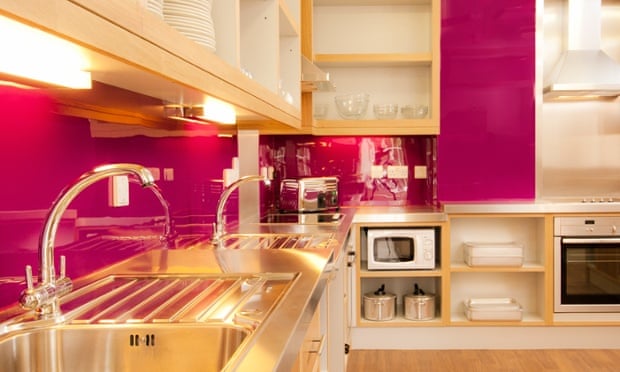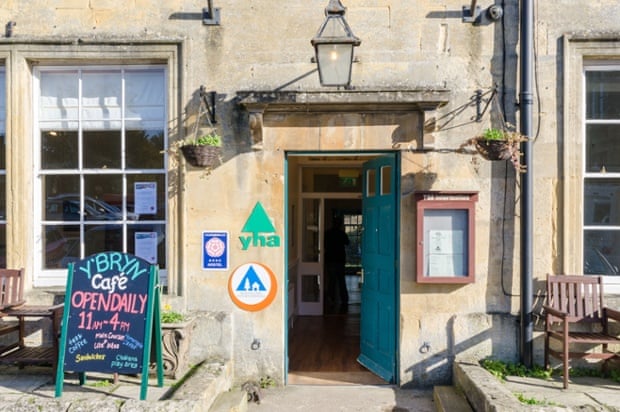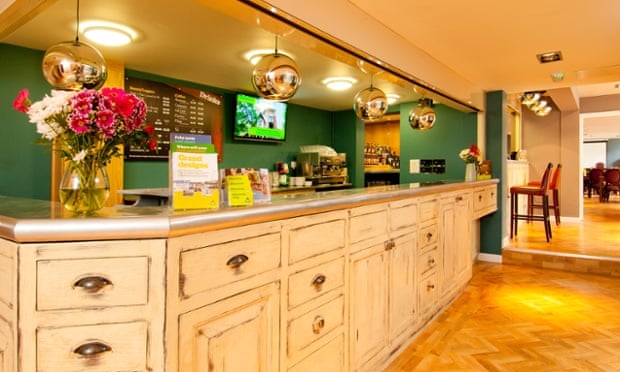In my teenage years, a summer spent youth hostelling with friends was one of the only holiday options that met with universal parental approval. A painstakingly wholesome, budget-friendly dose of communal self-catering, making new chums over a couple of jolly rounds of cribbage, then going upstairs to sleep with them. No, mum, not like that.
But single-sex dormitories filled with snorers and mud were a tough sell to those of us who’d moved on from Enid Blyton to Hunter S Thompson and feared sharing a bunk bed with some prematurely bearded, Kumbaya-humming hostel stereotype of the age.
The extent to which the phenomenon has fallen off the radar became clear as I questioned my teenage daughters en route to the YHA’s branch in the Cotswold town of Stow-on-the-Wold: neither had ever heard of a youth hostel. The eldest admitted she was expecting to spend the weekend with troubled runaways.
“Times have changed,” read the youngest aloud from our YHA accommodation guide. “You don’t have to share, do chores or stay out in the rain.” Her tone made it plain that this was a misguided attempt at reassurance. The YHA has reinvented itself of late, but it still sounded like a modestly enlightened regime of National Service.

We walked past the hostel twice before spotting the little green-triangle logo. Being a majestic double-fronted 17th-century townhouse, it hardly looked the part. Then again, very few YHA hostels do: founded in 1930, the association snapped up most of its properties either side of the war, when grand old houses were going cheap.
Heaving open the big front door, it felt as if we’d chanced upon some portal into a furtive realm of modestly priced self-catering accommodation known only to the few. How right we were. The fleece-clad manager explained that due to a rash of cancellations his only other guests were a trio of Taiwanese cyclists who’d already gone to bed.
Ours was one of the family rooms that are steadily replacing the dorms of old. A pair of bunk beds, a huge window overlooking the golden-stoned houses opposite, and – hostel diehards look away now – an en suite loo and shower, with hot water and everything. Atop each bare mattress lay an uncovered duvet and two pillows, plus a sealed plastic bag containing the necessary linen. For my daughters, the no-frills, DIY accommodation vibe was an exciting novelty: “It’s like camping indoors.”

Photograph: Alamy
Cooked meals were on offer, but in keeping with the cost-conscious, self-sufficient spirit of hostelling we repaired to the kitchen, via the Co-op up the street. The catering facilities were impressive and well-ordered: my youngest, an obsessive administrator, was delighted to find a roll of adhesive labels and a biro beside the communal fridge, and eagerly tagged our breakfast provisions to prevent them falling into Taiwanese hands.
The hours of darkness, we discovered, remain the novice hosteller’s greatest challenge. Aside from a modest telly, the entertainment options were in tune with my laziest preconceptions: a couple of dozen careworn paperbacks, and a stack of well-used board games.
I didn’t tell the girls that for a small charge we could have Wi-Fi: how much more convivial and rewarding, I insisted, how much more hostelly, to stroll en famille through the comely streets of Stow.
Stratford-upon-Avon, where we stayed the night after, was better still: a £1.2 million renovation has added a new restaurant and cafe to a regal Georgian mansion in three acres of landscaped grounds. The grandly proportioned, eclectically decorated communal areas contained a dozen or so fellow guests: a large barefooted woman of middle years, a spirited gaggle of young Spaniards, and – yes! – a prematurely bearded teenager with his earnest girlfriend. Such a motley gathering in such an inappropriate residence – it was as if we’d been thrown together by fate, like multinational refugees in a requisitioned wartime mansion. We ate amid a babel of laughter. Hostelling is cheap (beds here from £15); it’s also dependably cheerful.

The after-hours facilities were a step up too: a cosy little TV lounge, and a vast games room that allowed the Spaniards to destroy all-comers at pool. Also: a bar, offering ideal preparation for a night in Family Room 11, with its bold furnishings and tightly packed bunks. I had set off on this trip expecting to suffer a return to travel’s austere and awkwardly communal past. Clambering into bed, I instead beheld a vision of its virtuous, sustainable and – sorry, kids – beerily snore-ravaged future.
• 01629 592 700, yha.org.uk. Stow-on-the-Wold: private rooms from £23, dorm beds from £13.50. Stratford-upon-Avon: rooms £29, beds £15
The dawn of youth hostelling
The first youth hostel in Britain opened at Pennant Hall, near Llanrwst, North Wales, in December 1930 – and closed the following year due to sewage contamination, writes Rachel Dixon. In 1931, another 75 hostels opened, two of which are still in use today: YHA Idwal Cottage, Snowdonia, and YHA Street, Somerset. Motorists weren’t welcome, alcohol was banned, dorms were single-sex, strict curfews were imposed and duties ranged from washing up to replenishing water supplies. Nevertheless, by 1939 there were 297 hostels and 83,418 members.
Powered by WPeMatico











